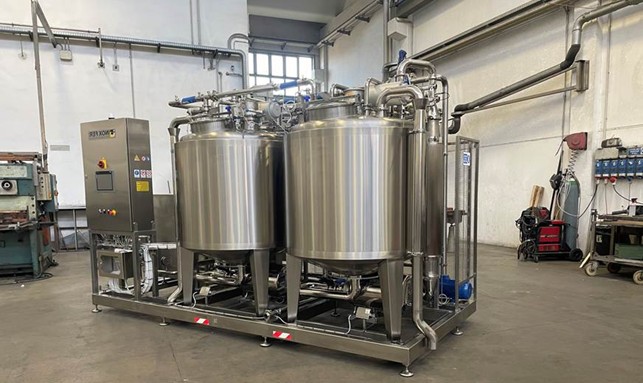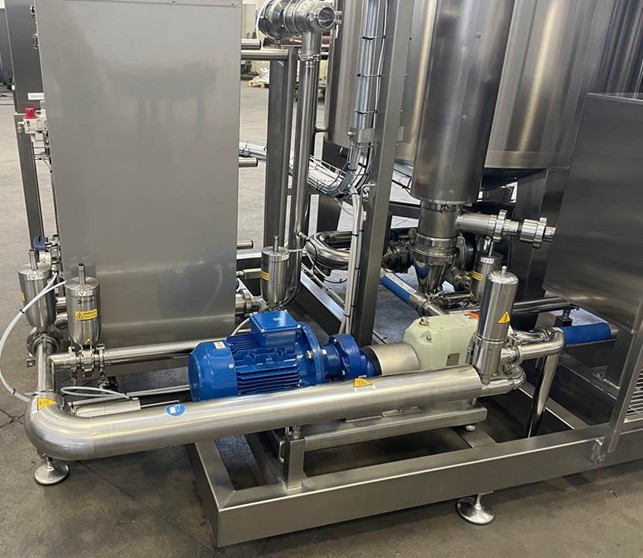Sommario
When we talk about food safety, we’re not just referring to the quality of raw materials or production processes. An often less visible, yet equally crucial, aspect concerns the materials and machinery that meet food during processing, storage, and distribution. This is where the MOCA regulations and the related Declaration of Conformity come into play, a document certifying compliance with the requirements set by European legislation.
What does MOCA mean?
The term MOCA (Materials and Objects in Contact with Food) is linked to a European Council Directive on materials intended to come into contact with food. It was developed to increase quality standards in food production and reduce public health risks by eliminating potentially harmful contamination caused by chemical migration from materials to products.
Types of MOCA objects
This definition includes objects such as containers, receptacles and packaging materials, as well as machinery intended for the processing or transformation of food.
Commonly used objects and materials
MOCA includes:
• Pots, pans, cutlery, and cutting boards
• Plates and glasses
• Labels and films in contact with food
• Plastic containers
Food processing equipment
Equipment and machinery designed for food processing or treatment are also considered MOCA, such as:
• Industrial ovens
• Blast chillers
• Pasteurizers
• Sterilizers
MOCA regulation
The European framework regulation for FCMs is Regulation (EC) No. 1935/2004, which establishes the fundamental provisions regarding the use of materials and objects in contact with food. It requires them, first and foremost, to be produced in compliance with good manufacturing practices so that, under normal or foreseeable conditions of use, they cannot transfer components to food in quantities that could:
pose a risk to human health,
unacceptably change the composition of food,
alter its organoleptic characteristics (odour, flavour, colour).
Regulation 1935/2004/EC (Framework Regulation on FCMs) requires that materials and objects intended to come into contact with food must be accompanied by a written declaration certifying their compliance with current regulations.
Regulation (EU) 2025/351: new rules for materials intended to come into contact with food (MOCA)
On February 21, 2025, Regulation (EU) 2025/351 was published in the Official Journal of the European Union, introducing important changes for materials and articles intended to come into contact with food (FCMs), with particular reference to the plastics sector, including recycled plastics.
The Regulation entered into force on March 16, 2025, with a transition period until September 16, 2026, during which it will still be possible to place plastic FCMs compliant with the previous regulation on the market.
The main changes introduced by Regulation 2025/351
Composition of plastic materials: they must contain only minimal amounts of non-intentionally added substances (NIAS) and guarantee a high degree of purity
Alignment with the REACH Regulation (EC 1907/2006) for the management of substances of unknown or variable composition
Stricter requirements for recycled plastic materials, with controls on recycling processes and traceability
Controls during the production process through sampling, to ensure compliance with the new provisions
Restrictions on the use of biocides in plastic materials, in line with Regulation (EU) 528/2012
Mandatory labelling to prevent deterioration of FCMs and correct instructions for use
MOCA Declaration: What is it?
The MOCA Declaration of Conformity (DoC) is the official document certifying that a material, object, or machine complies with all the requirements set by European regulations.
It is mandatory and must accompany the product throughout the entire supply chain, from the manufacturer to the end user.
Who is required to prepare the MOCA declaration?
Pursuant to Regulation 1935/2004/EC, the following are required to prepare and submit the MOCA Declaration of Conformity:
producers of materials or semi-finished products intended to be transformed into final products
importers placing substances, intermediate materials, or finished products from non-EU countries on the EU market
end users
producers of final products who transform or assemble MOCA components (e.g., manufacturers of food processing machinery)
producers of substances intended to be used in the production of MOCA.
The MOCA Declaration of Conformity is made up of a set of declarations as it is not unique for all operators involved in the MOCA production chain.
From the raw material producer to the retailer, each operator issues its own declaration of conformity to the downstream economic entity and retains the one received from the upstream economic entity.
The information contained in the declaration of conformity is not the same for all economic operators as it depends on the operator’s position in the supply chain and the type of product being sold to the entity further down the supply chain.
Is the MOCA Declaration sufficient to be compliant?
No. The declaration is mandatory, but it is not the only requirement.
To comply with the MOCA regulation, it is also necessary to:
conduct specific tests to demonstrate the safety of materials in food contact conditions
have a traceability system to trace the origin of raw materials and isolate defective batches
follow the guidelines of EC Regulation 2023/2006, which regulates production processes to ensure hygiene and safety
ensure that MOCA materials include instructions on how to use them correctly (e.g., microwave-safe or heat-resistant)
maintain complete documentation that includes test results, raw material certifications, and risk assessments
Does the MOCA Declaration expire?
There is no specific deadline.
However, each Declaration of Conformity must be reviewed/updated if there are significant changes in the composition and characteristics of the raw materials used, or significant variations in the production cycle, or, more simply, when legislative references change.
It may be appropriate to schedule at least an annual review to demonstrate the economic entity’s particular attention.
Is the MOCA declaration valid for non-EU countries?
No, the MOCA (Materials and Objects in Contact with Food) declaration of conformity is a specific requirement for economic operators within the European Union. Food safety regulations and requirements vary significantly from country to country; therefore, products destined for the non-EU market must comply with local regulations in the destination country and may require specific certifications or additional documentation. Some examples are the FDA, UK Food Contact Regulation, China GB Standards, etc.
Obligations for the Food Business Operator
Any food business, of any kind, that uses materials and objects intended to come into contact with food products as part of its operations is required to ensure their compliance with current regulations, their suitability for food contact, and their technological suitability for their intended purpose. In practice, they must request a declaration of conformity from the manufacturer or wholesale distributor, retain it, and, above all, use the materials and objects in accordance with the conditions of use declared by the manufacturer.
Inox-Fer’s compliance with MOCA regulations
All Inox-Fer machines and systems, designed and built for cooking, mixing, and transferring food products, comply with the safety requirements of Directive 2006/42/EC and EC Regulation No. 1935/2004.
Declaration of a liquor production plant
Inox-fer has declared MOCA compliant for a system designed for dosing ingredients (both liquid and powder), heating, and mixing in the liquor industry.
In particular, special attention was paid to the choice of plastic materials used in the flexible connections to separate the weight of the tanks on load cells from the rest of the system attached to the frame.
These components, in this specific machine, must withstand pressures of up to 3 bar and temperatures of up to 95°C during preparation, as well as offering good resistance to chemical cleaning.

The use of EPDM and its advantages
The flexible fitting has an EPDM (Ethylene Propylene Diene Monomer) inner tube: a smooth, white, food-grade synthetic rubber that resists bacterial growth. It also has a synthetic wire reinforcement with a steel spiral embedded in the wall. Finally, it has a weather-resistant blue EPDM coating.
We designed a balanced combination of chemical resistance and the physical parameters of temperature and pressure of the fluid being processed, ensuring that the certifications for individual components are maintained.
This principle has also been applied to the plastic components present, such as valve and heat exchanger gaskets, coupling fittings, and mechanical pump seals (centrifugal and lobe).
• Resistance to abrasion and aging
• Resistance to extreme temperatures: It maintains flexibility and sealing at temperatures ranging from -40°C to +120°C and up to 150°C in some formulations, and is also resistant to heat and water vapor.
• Elasticity: Being an elastomer, it returns to its original shape after being stretched or compressed.
• Impermeability: It is highly impermeable to water and steam.
• Chemical resistance: It resists many acids, alkalis, and polar solvents, but not fossil oils and some halogenated solvents.

Security and compliance: a journey to be undertaken with an expert partner
MOCA compliance is a fundamental requirement to ensure food safety and protect consumers and businesses along the entire production chain. Choosing certified materials, controlled processes, and machinery designed according to current regulations is a strategic factor for those operating in the food industry.
If you need assistance in choosing MOCA-compliant systems or want to learn more about how to adapt your production line, the Inox-Fer team is ready to assist you. Contact us for a personalized consultation.
